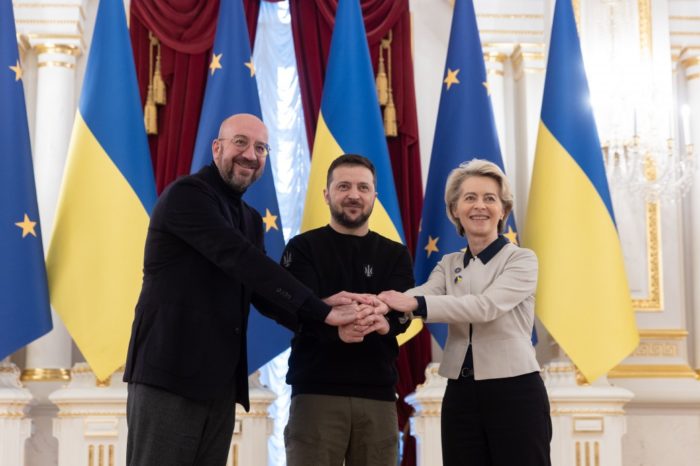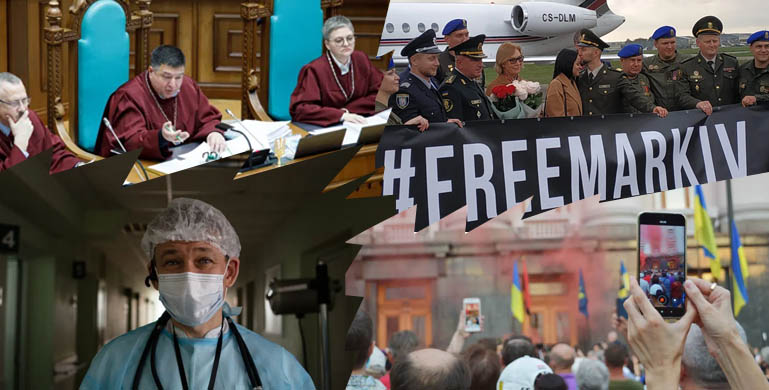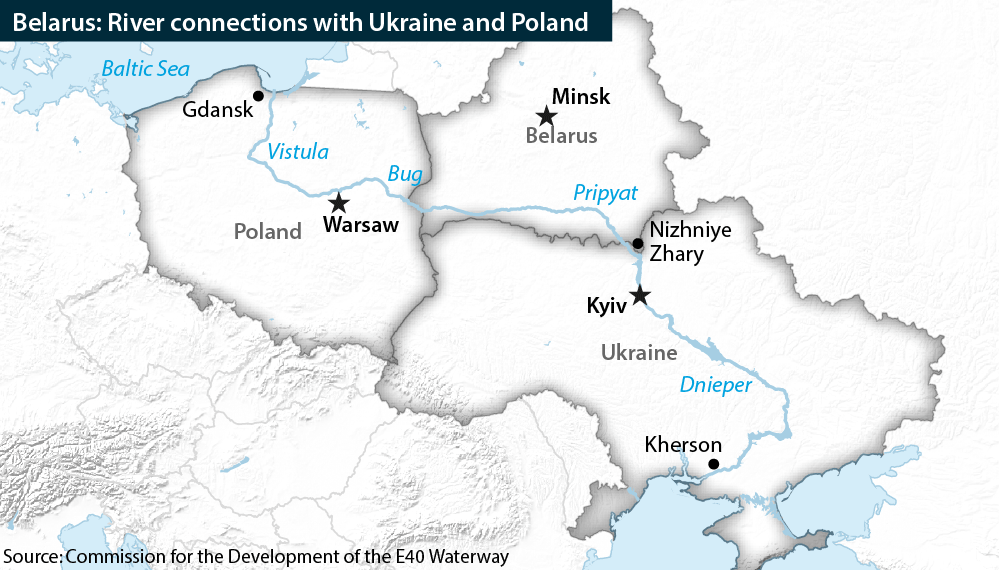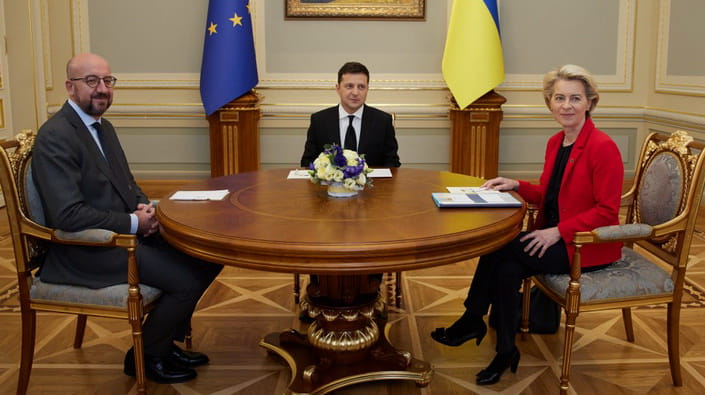On 3 February, the first EU-Ukraine summit since the Russian full-scale invasion tk place in Kyiv.
It was preceded by a no less important event: the day before, EU Commission President Ursula von der Leyen arrived in Kyiv with 15 out of 27 EU Commissars for a meeting with the Ukrainian government — a first in the history of the EU.
Euromaidan Press explains the signals, agreements, and takeaways of this summit and what comes next for EU-Ukrainian relations, drawing on extremely useful analyses by European Pravda.
The #1 signal: Ukraine will become an EU member
Already ahead of the summit, journalists were briefed in Brussels that the question of Ukraine’s accession to the EU is no longer an “if,” it is “when.” And this was clearly signaled by Ursula von der Leyen:
“Ukraine has become the center of our continent… where the future of Europe is written. Almost the entire college of the European Commission has come to Kyiv today because we want to write that future together with you,” she said, opening the meeting with the Ukrainian government.
“Today the Summit made two things absolutely clear,” the President of the European Council Charles Michel said on 3 February during the joint press conference following the EU-Ukraine Summit in Kyiv. “The EU will support Ukraine in every way we can for as long as it takes. We are not intimidated by the Kremlin. We are the family: Ukraine and the EU. The future of Ukraine is within the European Union. We will be right by your side to rebuild a modern, prosperous Ukraine firmly anchored on our common European path,” Charles Michel concluded.
However, the EU Commission cannot say anything about the specific timeframe of Ukraine’s movement toward the EU. One thing is clear, however — Ukraine must implement the seven criteria needed to launch negotiations on accession.
We described Ukraine’s progress towards meeting those criteria here:
To decide whether Ukraine has met all the criteria, the EU will assess the progress of Ukrainian reforms, the EU-Ukraine joint statement issued on 3 February following the EU-Ukraine Summit in Kyiv says.
The EU will decide on further steps once Ukraine fulfills the conditions outlined in the European Commission’s opinion on its EU membership application. The Commission will report on Ukraine’s fulfillment of the conditions as part of its regular enlargement package in 2023, according to the EU-Ukraine joint statement.
Earlier before, the EU insisted that the assessment of Ukraine’s progress in fulfilling the criteria required to start the accession negotiations will not be given to Ukraine until the autumn of 2023.
As a result of the 24th EU-Ukraine Summit in Kyiv, the EU agreed to put the oral report on Ukraine’s progress on paper and hand it over to Ukraine in the spring. Therefore, Ukraine gets an opportunity to correct its mistakes on the way to the fulfillment of the seven criteria required to start the accession negotiations earlier.
“We take note of the Commission’s intention to provide an update in spring 2023, which will also be conveyed to Ukraine through the appropriate channels,” the EU-Ukraine joint statement stipulated.
Brussels made it clear: to convince all the Ukraine-skeptics in the EU and start negotiations on accession, Ukraine must implement all the EU Commission’s requirements, not leaving any homework unfinished. Kyiv has assured that it understands this.
However, Kyiv signals optimism. During the joint press conference following the EU-Ukraine Summit in Kyiv, Ukraine’s President Volodymyr Zelenskyy stressed that the primary task of his government is to start negotiations for EU membership in 2023.
“Ukraine should join the EU. We keep working hard to get ready for the accession negotiations,” Zelenskyy said.
Overall, the EU is satisfied with the speed of reforms in Ukraine, taking into account the war:
“The EU acknowledged the considerable efforts that Ukraine demonstrated in the recent months towards meeting the objectives underpinning its candidate status for EU membership, welcomed Ukraine’s reform efforts in such difficult times…” the statement says.
Particularly, it noted that Ukraine has achieved progress in ensuring the effective and independent work of anti-corruption institutions and aligning Ukraine’s audio-visual legislation with the EU.
However, it also said that work remains to be done regarding implementing Ukraine’s judicial reform in accordance with the recommendations of the Venice Commission, particularly in selecting politically independent judges for the Constitutional Court. These reforms will be key for the EU in assessing Ukraine’s progress.
Movement towards EU single market is the priority
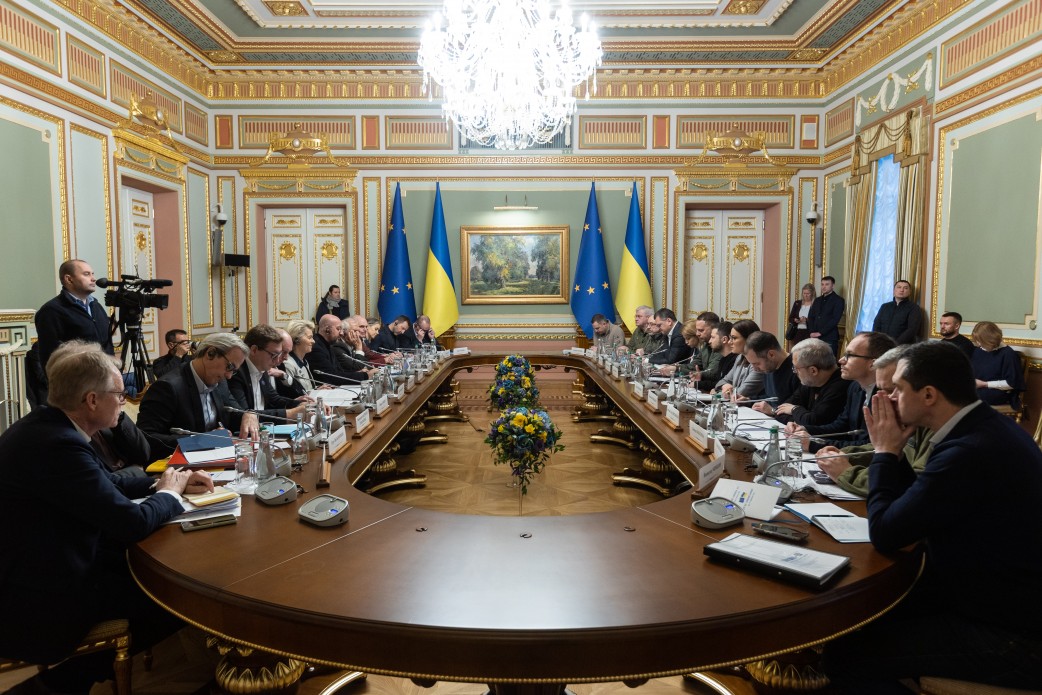
While predicting the political decision of Ukraine’s accession to the EU is impossible, they are already practically moving closer through trade and economic development. During the meeting with EU Commissars and afterward, it was stressed that movement towards the single market of Ukraine and the EU is the priority.
Several important practical decisions were made to ensure this continues:
- The “customs visa-free regime” for Ukrainian exports will be prolonged for a year, von der Leyen announced. This extraordinary unilateral measure, which nullified all customs payments to support Ukrainian exports, was adopted in the summer of 2022 and causes discontent among some EU producers;
- The free entry into the EU of Ukrainian freight carriers will be extended for a year as well;
- The EU Commission announced it is ready to move towards a single market with Ukraine. This means that the EU will not only drop tariff instrument but also recognizes all checks and certificates issued by Ukrainian authorities, while Ukraine will implement EU regulations, safety standards, etc in the realm of both goods and services. An Action plan for deepening the implementation of the free trade zone between Ukraine and the EU adopted by the EU Commission and Ukraine envisions that some customs and quotas will not be restored even after Ukraine’s victory, which will further facilitate the presence of Ukrainian goods on the EU market.
- Ukraine will soon have free roaming with the EU.Ukraine and the EU will soon mutually abolish roaming fees, a decision expected to be made in the coming months.
- Steps to liberalize the export of Ukrainian meat to the EU will be made. The Ukrainian government will attempt to lift certification restrictions in order to allow free access of Ukrainian meat products in the EU market.
- The EU will move towards adopting an “industrial visa-free regime” with Ukraine. This long-awaited regime will remove the need for additional safety certification for Ukrainian goods. But for this, Kyiv must convince Brussels that its national verification system is reliable. Thus,the Ukrainian government and the EU Commission have made it a priority to conduct negotiations and adopt the ACAA (Access of Ukrainian goods to the EU market) Agreement in 2024, which will bring the EU-Ukrainian single market closer to reality.
- A Memorandum between Ukraine and the EU on a strategic partnership in renewable gases, biomethane, hydrogen, and other synthetic gases was signed.
European Union to continue providing support to Ukraine as long as it takes
The EU will continue providing political and military support to Ukraine as long as it takes, according to the EU-Ukraine joint statement following the EU-Ukraine Summit in Kyiv.
The support includes military aid of around €3.6 billion under the European Peace Facility and the EU Military Assistance Mission to train 30 000 Ukrainian soldiers in 2023.
Together with the military support provided by EU member states, the overall EU military support to Ukraine is estimated at close to €12 billion.
The EU reconfirmed its solidarity with Ukraine in countering hybrid threats and cyberattacks and its commitment to continue the support in this regard. The EU and Ukraine will continue enhanced cooperation in cybersecurity to strengthen the joint capability in tackling Russian state-controlled information manipulation and interference, including disinformation, as well as building resilience in Ukraine’s digital transformation.
Furthermore, the EU reiterated its readiness to support Ukraine’s initiative for a just peace, based on respect for Ukraine’s sovereignty and territorial integrity.
Apart from that, the EU will continue supporting Ukraine financially. Overall assistance to Ukraine pledged both at EU and Member states level so far amounts to nearly €50 billion, which includes financial, humanitarian, emergency, budgetary, and military support. This also includes the commitment to provide up to €18 billion MFA and package for short-term EU financial relief financing Ukraine’s immediate needs and rehabilitation of critical infrastructure for 2023.
An additional €10 billion was provided in support to refugees. Ukraine welcomed the first disbursement of €3 billion that contributed to lessen the pressing liquidity needs early in the year, according to the EU-Ukraine joint statement.
The EU will continue supporting Ukrainian refugees. Around 8 million Ukrainians have been provided shelter from the Russian war of aggression in the EU, the EU-Ukraine joint statement reported.
Displaced persons from Ukraine seeking refuge in the EU will continue to be protected as foreseen under the Temporary Protection Directive until at least March 2024.
United in responding to Russia’s unprovoked invasion Ukraine
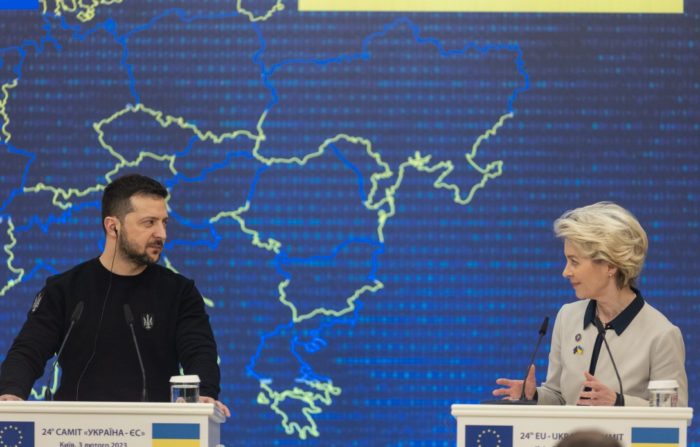
Ukraine’s right to retake Crimea
The EU condemned Russia’s escalating war of aggression against Ukraine that violates international law, including the principles of the UN Charter.
“We firmly reject and unequivocally condemn the attempted illegal annexation by Russia of Ukraine’s Donetsk, Luhansk, Zaporizhzhia and Kherson regions. As in the case of Crimea and Sevastopol, the European Union will never recognize as lawful any attempted illegal annexations of any parts of Ukrainian territory,” the statement says.
The above phrase signals that the EU sees no difference between Russia’s annexation of Crimea and occupation of southeastern Ukraine. Moreover, Ukraine has the right to militarily regain Crimea, the statement details, in the first such admission in an international document:
“In accordance with the UN Charter and international law, Ukraine is exercising its inherent right of self-defense against Russian aggression. It has the right to liberate and regain full control of all occupied territories within its internationally recognized borders.”
Prosecuting Russia for its crimes
Ukraine is pushing for a special tribunal to bring Russia’s leaders justice for their invasion of Ukraine. Although the EU did not adopt a final decision on such a tribunal, during the summit, it supported establishing a mechanism to prosecute the crime of aggression and a special office in The Hague to help prosecute Russia for crimes in Ukraine.
The International Center for the Prosecution of the Crime of Aggression in Ukraine in the Hague, currently home to the UN’s principal judicial organ — the International Court of Justice, will coordinate the collection of evidence and join the investigation by the European crime agency Eurojust.
The new center is “a strong symbol of our support for Ukraine in the face of Russia’s unprovoked and unjustified aggression,” Von der Leyen said ahead of the summit. “Russia must be held accountable in courts for its odious crimes.”
“We stressed that war crimes and the other most serious crimes committed during Russia’s war of aggression against Ukraine of which there is growing evidence, are a gross violation of international law. We underlined our support for the investigations by the prosecutor of the International Criminal Court. Russia, and all perpetrators and accomplices, will be held to account,” according to the EU-Ukraine joint statement.
Sanctions against Russia will grow
The EU is ready to strengthen sanctions in coordination with global partners while ensuring their effective implementation and preventing circumvention, and calls for all countries to join them, the statement says.
Regarding the upcoming tenth package of sanctions, they will cost Russia €10 billion, the President of the European Commission Ursula von der Leyen announced on 3 February during the EU-Ukraine Summit in Kyiv.
“Russian society is already paying a high price due to the implemented sanctions,” von der Leyen said. “The 10th package of sanctions against Russia is being prepared. We plan to implement it by 24 February 2023. It will be worth around €10 billion.”
The tenth package of sanctions will focus on the measures needed to prevent Russia from using military technologies, particularly — drones, such as the Orlan, in which western components were found despite sanctions.
“In other words, we are taking a closer look at the components found, for instance, in drones. We must make sure they won’t be accessible for Russia,” von der Leyen added.
It will also include restrictions on Russia’s nuclear sector and missile program, among other limitations.
The EU will also step up its work towards the use of Russia’s frozen assets to support Ukraine’s reconstruction and for the purposes of reparation, in accordance with EU and international law.
“The EU will further step up its ongoing diplomatic efforts in support of Ukraine in all relevant international fora, calling for steadfast solidarity with Ukraine against Russia’s war of aggression,” the EU-Ukraine joint statement announced.
The EU and Ukraine called on Iran to stop supporting Russia with weapons and on the Belarusian authorities to stop enabling the Russian war of aggression by permitting Russian armed forces to use Belarusian territory and by providing support and training to the Russian military.
“We strongly condemned the military support to Russia’s war of aggression provided by the Iranian authorities, which must stop. The Belarusian regime must also fully abide by its obligations under international law. The EU will continue to respond to all actions supporting Russia’s unlawful and unjustified war of aggression and remains ready to move quickly with further restrictive measures against Belarus,“ the EU-Ukraine joint statement stressed.
Finally, the EU reiterated its readiness to support Ukraine’s initiative for a just peace based on respect for Ukraine’s sovereignty and territorial integrity.
“We expressed our support to the peace formula of President Zelenskyy and our commitment to actively work with Ukraine on the 10-point peace plan. In this regard, we support the idea of a Peace Formula Summit aiming at launching its implementation. We will work together to ensure the widest possible international participation,” the EU-Ukraine joint statement stipulated.
Support for Zelenskyy’s peace plan and summit plans
“We expressed our support to the peace formula of President Zelenskyy and our commitment to actively work with Ukraine on the 10-point peace plan. In this regard, we support the idea of a Peace Formula Summit aiming at launching its implementation,”
the communique states. Zelenskyy’s peace plan is a document that the Ukrainian President presented at the G20 summit and is currently promoting internationally as the framework for war resolution. It is Ukraine’s vision of its victory and Russia’s capitulation, envisioning Russia’s withdrawal from Ukraine, reparations, etc. The EU has now given it powerful support during this summit.
EU to support fast recovery and reconstruction of Ukraine
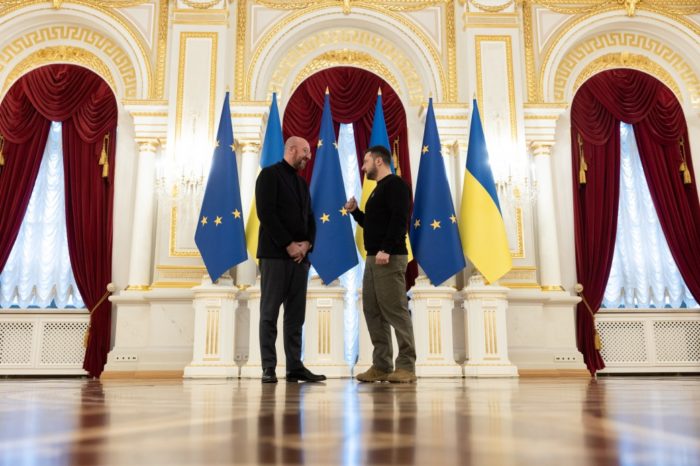
The European Union will support Ukraine on the way to its fast recovery and reconstruction after the war is over, the President of the EU Commission Ursula von der Leyen claimed on 3 February during the press conference following the EU-Ukraine Summit in Kyiv.
“Ukraine is a true inspiration for Europe. We will support your fast recovery and your reconstruction. And we will make Russia pay for the brutal destruction it is causing,” von der Leyen said.
Ukraine is a true inspiration for Europe.
We will support your fast recovery and your reconstruction.
And we will make Russia pay for the brutal destruction it is causing ↓ https://t.co/IAtQqMWing
— Ursula von der Leyen (@vonderleyen) February 3, 2023
Russia’s ongoing campaign of systematic missile and drone strikes against Ukrainian civilians, civilian targets, energy and telecommunications infrastructure, and other utilities, inflicts even more suffering on the Ukrainian people and is a serious violation of International Humanitarian Law, the Commission states.
In this context, the EU welcomed the coordination mechanism agreed at the Paris conference on Ukraine’s resilience and reconstruction on 13 December 2022 and the role of the Union Civil Protection Mechanism in its implementation and underlined the importance of close cooperation with the G7 and all international partners, the EU-Ukraine statement specified.
European Commission will provide Ukraine with €1 billion to rebuild civilian infrastructure, such as residential buildings, schools and hospitals damaged or destroyed by the Russian invasion, according to the EU-Ukraine joint statement following the EU-Ukraine Summit in Kyiv.
“We have already created a special department that will coordinate the process of restoration, which will begin immediately,” the President of the European Commission Ursula von der Leyen said in Kyiv on 3 February.
The EU is fully committed to providing, together with partners, support to Ukraine’s fast recovery and reconstruction, steady assistance in the restoration of Ukraine’s critical infrastructure, such as the rehabilitation of schools for Ukrainian children, energy generators, and LED lightbulbs, among other measures. In this context, the EU has also announced a new package of up to €25 million to support the Humanitarian Mine Action.
“Russia’s ongoing campaign of systematic missile and drone strikes against Ukrainian civilians, civilian targets, energy and telecommunications infrastructure, and other utilities, inflicts even more suffering on the Ukrainian people,” the EU-Ukraine joint statement stressed.
In the context of continued Russian attacks against civilian and critical infrastructure, which threaten the provision of basic services, the EU expressed its full commitment to continue providing and coordinating the full spectrum of humanitarian aid and assistance to the Ukrainian society, in close cooperation with international humanitarian actors, according to the EU-Ukraine joint statement.
The EU and its Member States have provided in kind assistance worth €527 million, including in the area of energy, through the Union Civil Protection Mechanism, and €485 million worth of humanitarian assistance in 2022.
The EU condemned Russia’s actions at Ukraine’s Zaporizhzhia nuclear power plant and called on Russia to immediately cease actions endangering the safety and security of civilian nuclear facilities.
“We underlined our full support for the International Atomic Energy Agency’s work to assist Ukraine in ensuring nuclear safety and security. The EU will remain united in the face of Russia’s weaponisation of energy,” the EU-Ukraine joint statement stressed.
Overall assistance to Ukraine pledged at both EU and member state level so far amounts to nearly €50 billion.
Related:
- How close is Ukraine to becoming an EU member?
- Ukraine to participate in EU’s Single Market program
- European Council agreed on 545 million euro assistance package for Ukraine
- Von der Leyen believes Ukraine will become EU member
- European Parliament adopted resolution re Ukraine EU accession negotiations
- Hague to host center to collect data on Russian war crimes in Ukraine
- EU top diplomat does not rule out delivery of fighter jets to Kyiv


